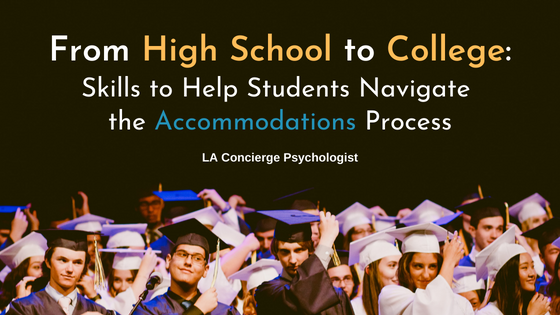
Transitioning from high school to college can be challenging and stressful. Unlike in high school, you need to self-advocate. In college, IEP teams don’t exist. Additionally, your parents no longer coordinate all of your needs. You must seek out and ask for the college accommodations you need to be successful.
Federal law dictates that colleges must provide “reasonable accommodations”. These are things like extended test time, class notes, and audio books. This is very different than the accommodations you may have received in high school. IEP accommodations tend to be very individualized. College accommodations are more “one size fits all”.
Self-advocating requires that you know what accommodations work best for you. You also must feel comfortable asking for them. Don’t walk into a meeting expecting that the college will know what you need. Also, it’s very important to start this process prior to the semester or quarter. If you wait, then you may not have accommodations until several weeks into the semester. This may cause you to start falling behind.
Does all of this sound daunting? Don’t worry. There are five simple steps to follow to securing your accommodations at college.
1. Contact the Disabilities Office
As mentioned earlier, contact the office sooner rather than later. It’s better to have your accommodations secured. Even if you don’t think you need them, have them just in case! When you first contact the disabilities office, you’ll do a little bit of detective work. Figure out the required documentation to get accommodations and the process of how to get your accommodations approved.
2. Meet with the Disabilities Office
Once you get the documentation you need, schedule a meeting. I suggest taking notes or audio taping the meeting. This ensures you don’t forget any important information from the meeting. Also, prepare to give the disabilities counselor the needed documentation. Don’t forget to tell the disabilities counselor what accommodations you feel you need. If your requests are denied, ask if there is an appeal process. Don’t give up so easily— this is part of self-advocating!
3. Meet with Your Professors
Next, meet with your professors. Ensure they know your entitled college accommodations. Professors should receive notification from the disabilities office about your accommodations. However, they often don’t have time to read the notification or remember specific accommodations.
You may need to work with your professor to arrange some accommodations. For example, if you’re entitled to a note taker, you likely need your professor’s help finding someone in class to take the notes. If you take tests in a different room, your professor will likely need to know that ahead of time as well. Working with your professor makes everything go smoother!
4. Follow-up with the Disabilities Office
Sometimes people do steps 1-3 and think their job self-advocating is done. But that’s not true! During the semester or quarter, things may come up. You may need to report problems with your accommodations to the disabilities office. I’ve heard stories some horror stories. For example, someone was supposed to get his books on tape but never received them. The student didn’t follow-up with the office. As a result, he did very poorly in his class. Also, sometimes your accommodations won’t be helpful in the way you thought they would be. Your job is to follow-up with the disabilities office and request changes you think are needed.
5. Renew Your Accommodations
Unfortunately, people often overlook this crucial step. In college, you must renew your accommodations with the disabilities office every semester or quarter. So don’t forget to meet with your disabilities counselor and secure your accommodations to ensure another successful semester or quarter!
Click here for more information on College Transition and Gap Year Consultation.
Are you struggling, even with your college accommodations? Send us a message or book a free 20 minute consultation call with Dr. Barajas or Dr. Goldman.



